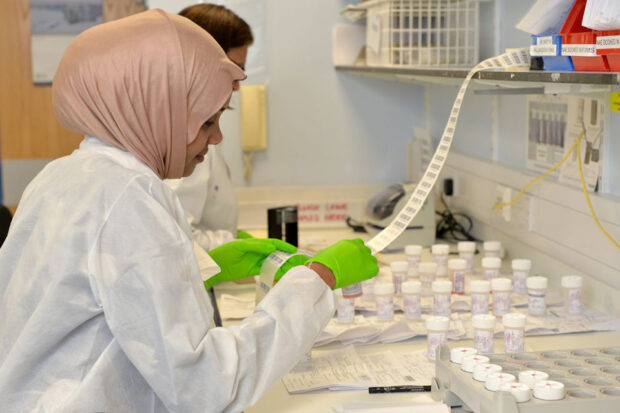
Every year, Cervical Screening Awareness Week highlights the importance of regular cervical screening for women and people with a cervix.
The NHS Cervical Screening Programme helps prevent cancer by detecting abnormalities of the cervix which can be treated before they get a chance to turn into cervical cancer. Screening saves thousands of lives every year by checking for the presence of high-risk human papillomavirus (HPV), which causes nearly all cervical cancers.
A health professional takes a sample from the cervix and this is sent to a laboratory to check for high-risk HPV. If high-risk HPV is found, the laboratory then tests the sample for abnormal cell changes.
However, approximately 3 in 10 people do not take up the offer of screening. In England, the NHS Cervical Screening Programme currently prevents around 70% of cervical cancer deaths, but it could prevent an estimated 83% if everyone who is invited attended screening regularly.
It is important to remove barriers to screening attendance where possible and a future option could be for people to take their own sample – a vaginal swab – rather than having a clinician take their sample. A study was set up in 2021 in England as a first step in finding out if vaginal self-sampling could be offered as an alternative option alongside the traditional clinician-taken cervical screening test.
This study, HPValidate, is collecting 5,000 samples from general practice and 1,750 samples from colposcopy clinics to determine the accuracy of vaginal self-samples compared to clinician-taken samples. Significant progress has now been made with this study and nearly 80% of the required samples have been collected.
People participating in HPValidate are invited to take a self-sample as well as the usual clinician-taken sample when they attend their GP practice for cervical screening. The laboratories test both the self-sample and clinician-taken sample for sensitivity (how well the test correctly detects someone with HPV) and specificity (how well the test correctly identifies someone who does not have HPV).
HPValidate is expected to report its final results early in 2024. Several self-sampling devices and laboratories are involved in the study and the data will be analysed to provide a validated HPV self-sampling device and test combination.
This validated combination will be used in an in-service evaluation that will provide the UK National Screening Committee with real world evidence on the effectiveness of offering HPV self-sampling in the NHS Cervical Screening Programme in England.
There is still some way to go, but the progress with HPValidate this year means we are a step closer to finding out if HPV self-sampling could be offered as an alternative method, and choice, to people in the UK at some point in the future.
Keep up to date
The UK NSC blog provides up to date news from the UK National Screening Committee. You can register to receive updates direct to your inbox, so there’s no need to keep checking for new articles. If you have any questions about this blog article, or about the work of the UK NSC, email screeninginformation@dhsc.gov.uk.